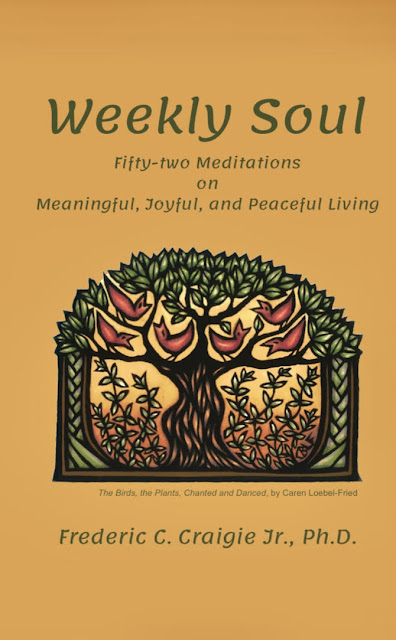Daily Excerpt: Weekly Soul (Craigie) - Meditation #29 (Psychological Pain)
Book of the Year (Mind, Body, Spirit) Gold
Reader Views Literary Award (Mind, Body, Spirit) Silver
Reader Views Literary Award (religion) Silver
Kops-Fetherling International Book Awards (Inspiration & Motivation) honorable mention
National Indie Excellence Award
Excerpt from Weekly Soul (Dr. Frederic Craigie)
-29-
Life
is a choice. Psychological pain is not a choice. Either way you go, you will
have problems and pain. So, the choice here is not about whether to have pain. The
choice is whether or not to live a meaningful life.
Steven C. Hayes
We all suffer.
The life free of distress and suffering is
illusory, or, at least, the quest to avoid psychological pain leaves you
spiritually hollow. Want to avoid anxiety? Don’t try anything new. Want to avoid
sadness? Don’t do anything where you could fail. Want to avoid grief? Don’t
have relationships.
You may see people out there who seem to
have lives of unbridled happiness and joy, but as you look closely, you’ll find
that their experience is more about transformation of suffering than the
absence of suffering. No less a joyful spirit than His Holiness the Dalai Lama
speaks of times when his own path has been enriched as he has experienced
sadness and grief.
As well, there are the sad stories of
people who look jaunty and ebullient to all the world but who wrestle with
their own demons inside. You may recall the death of Robin Williams, whose
public persona was one of constant gaiety and mirth but whose interior life was
apparently so intolerable that he committed suicide.
Whether to experience psychological pain
is not an option. It is. It will be. The choice is in how we respond to that
suffering.
My friend and long-time associate Ken
Hamilton, M.D., is a former surgeon who has dedicated the last several decades
of his life to developing a network of support groups that offer communities of
hope and healing in the face of all manner of adversity. He may be described as
“the Bernie Siegel of Maine” although I prefer to locate Bernie Siegel as “the
Ken Hamilton of Connecticut.”
Ken says, “This is what your life is
giving you. Now, what are you going to do with your life?”
The psychological distress we all face—unsettling
thoughts, hard feelings, disturbing images—just appear on the doorstep for
reasons that sometimes are clear and sometimes not. The challenge is to develop
the ability to have these experiences, to tolerate the distress of these
experiences, and still to make choices in the direction of living a meaningful
life.
Life is giving you a detached and often
unfairly critical boss, and you’re angry. It is what it is. You accept this,
you face this. Now, what are you going to do with your life? What are you going
to do that aligns with your deepest values?
Life is giving you a financial downturn or
a serious illness, and you’re fearful. It is what it is. You accept this; you
face this. Now, what are you going to do with your life? What are you going to
do that aligns with your deepest values?
Heaven forbid, life takes away from you
someone you dearly love, and you grieve. It is what it is. You accept this; you
face this. Now, what are you going to do with your life? What are you going to
do that aligns with your deepest values?
Acceptance is not about smooth sailing or
easy choices. You can tremble with fear. You can rage against the Universe. But
part of the blessing of your humanity is that even as you sit with the
suffering that you feel, you have the ability to choose how you carry on.
Reflection
- The sad story of Robin
Williams—a tragedy that the world has lost this person—calls to mind the
peril of comparing ourselves unfavorably to people who seem to have it all
together. At the same time, most of us have people in our lives who mentor
or model dignity and resilience in the face of suffering. Who has there
been for you who teaches you about facing and responding meaningfully to
suffering?
- When has there been a time in
your experience when you have been able to face—accept—psychological pain
and gather the energy of your heart and soul to respond to this suffering
in ways that show the best of who you are?
- In the coming week, notice how
you respond to unpleasant and painful thoughts, feelings, or images. What
do your responses show or teach you about acceptance and making meaningful
choices?
Author
Steven C. Hayes, Ph.D. (b. 1948) is an American
psychologist and educator, based in the Department of Psychology at the
University of Nevada. A prolific researcher and writer, he has authored dozens
of books and several hundred journal articles. He is the developer of
Relational Frame Theory, which has been the theoretical basis for the
development of Acceptance and Commitment Therapy, an empirically-based
counseling approach that merges mindfulness with values-based action. Hayes has
held most of the pertinent leadership positions in the world of applied
behavior therapy and has garnered a collection of lifetime achievement awards
in his field. The quotation comes from his seminal popular-press workbook, Get
out of Your Mind and into Your Life: The New Acceptance and Commitment Therapy
(New Harbinger, 2005).
For more posts about Dr. Craigie, including more excerpts from Weekly Soul, click HERE.
Sign up for the MSI Press LLC newsletter
Follow MSI Press on Twitter, Face Book, and Instagram.
in exchange for reviewing a current or forthcoming MSI Press LLC book?
Contact editor@msipress.com.
Want an author-signed copy of this book?
Purchase the book at 25% discount (use coupon code FF25)
and concurrently send a written request to orders@msipress.com.




Comments
Post a Comment